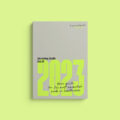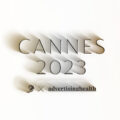Today we speak to Tim Hawkey, Executive Creative Director and MD at Area 23 in New York:
AH: What are the side-effects of a festival like Lions Health?
TH: I think overall, the side effects are good ones. Agencies go back to work in late June, inspired and invigorated to do great work. And it does raise the general level of the creative. But there are some negative side effects, and those mostly come in the form of award addiction, where the award becomes the brief, and we are making creative decisions because they will play well to a jury, and not because they will play well with our customers. We have to be very careful about that. I have found myself on the verge of such decisions (I’m only human), but I have a great team and they keep me honest.
AH: What would you say has been the best thing about this year’s festival?
TH: The best part of the festival for me is hunting down the creative teams responsible for the best work I saw, and making a real connection with them. It’s fascinating to hear how some of these campaigns were pulled off, how long they took, and the cool projects they’ve moved onto. Cannes is a paradise for recruiting, and I’ve got a suitcase full of O1 Visa applications.
AH: And the worst?
TH: The worst part is the scam. There was less scam in the pharma and health and wellness juries than there was in print, outdoor and mobile juries, but believe me, it was there. It comes in many forms. Sometimes it is blatantly something that the client never signed off on, like the Bayer print ads from ALMAPBBDO in Sao Paolo, but sometimes its more subtle, like client work that was modified for jury appeal, and the latter is very pervasive. Now we’re starting to see a next level of scam. Grey Singapore just won a bronze promo and activation lion for an app called “I Sea” which claimed to help sea farers in the Mediterranean pinpoint the location of Syrian refugees in the water. Wow, what a great idea. Turns out the whole thing is bullshit. The app is a thin façade, and if you actually downloaded it (I’m talking to you, jury) it would be obvious that the App did nothing.
Shame on Grey for being so exploitative, but also shame on the jury for being fooled so easily.
AH: Is there a cure for scam?
TH: I think few things put in place by Cannes Lions would help curb scam. First you could ask for client signatures on the submission, or at least an agency network CEO signature, affirming that the work is genuine, and submitted as it ran. If the CEO is signing off on it, they can’t later claim ignorance and point their finger at the offending local office. Second, I think Cannes should take the step of banning scam agencies from the festival for three years. Right now there is a ban clause in place, but it is for individuals, not agencies, and it is completely at the discretion Cannes Lions staff. In my opinion, ALMAPBBDO and Grey Singapore should be banned from Cannes. But we all know that isn’t going to happen. ALMAPBBDO spent $200,000 in Cannes entry fees this year alone. And $25,000 of that alone was for scam work for Bayer.
That’s a lot of money for Cannes Lions to say goodbye to.
But this shouldn’t just fall on Cannes Lions shoulders. The agencies have to take responsibility too. And this comes from the top. Holding companies that determine CEO compensation based on lion counts are going to end up with a lot of scam work. And agency network CEO’s that put lion quotas on local agencies (with consequences for underperforming) are going to produce a lot of scam work. I know ECD’s in some South American agencies that would be fired if they don’t deliver enough lions. And it pushes them to do some pretty drastic things to win awards.
AH: Did you have a favourite winner this year? If so, what was it?
TH: I do have a favourite. It was Surgeon Tryouts by TBWA/Hakuhoda Japan in Tokyo. They assembled a group of surgery school applicants, and assigned them these beautiful and nearly impossible tasks to assess there aptitude. They had to construct a 2mm origami swan, make a perfect piece of sushi on a single grain of rice, and reconstruct a deconstructed Japanese beetle. The ideas is simple, brilliant, and culturally relevant, but the execution took it to another level. Really beautiful print, and a very funny case film to boot.
AH: Did you notice any trends in the type of work that won? (Across both Pharma and Health & Wellness.)
TH: Not really. Or at least none that are worth writing about.
AH: What’s your prognosis for the healthcare industry post Lions Health?
TH: I don’t see Lions Health having any impact on the garbage-level advertising that is pervasive in our industry. But I do think for the agencies and clients that get it, this high, high level of recognition can mean the difference between really good work, and f@#kin’ great work. Its a big motivator, to a creative team that’s thinking about calling it a day, but decides to put on a fresh pot of coffee instead. Or to the client, when faced with a decision between two pieces of work, to take the route less travelled.
AH: Cheers Tim. I’ll put the kettle on then…
Join us next week as we continue our examination of another industry expert, and try to navigate our way through the learnings of this year’s Lions Health festival.






